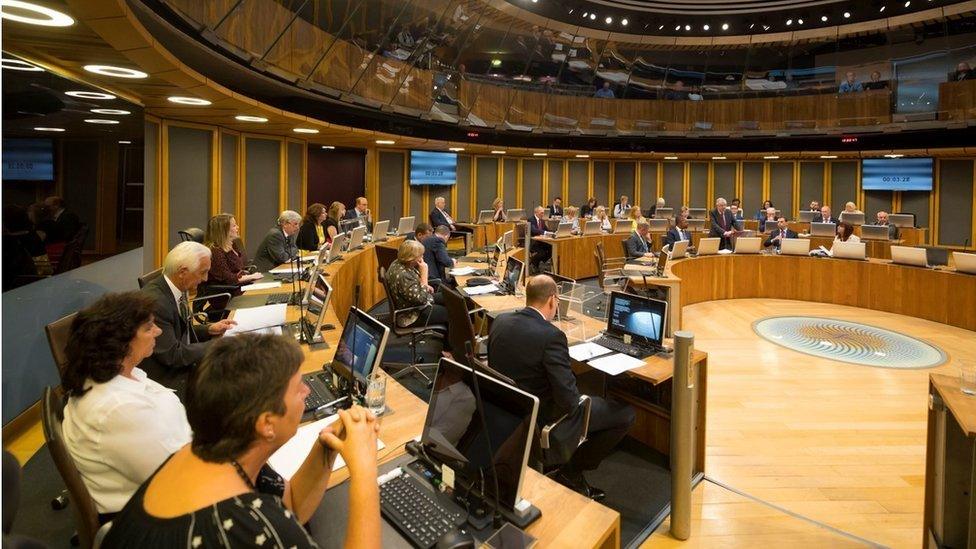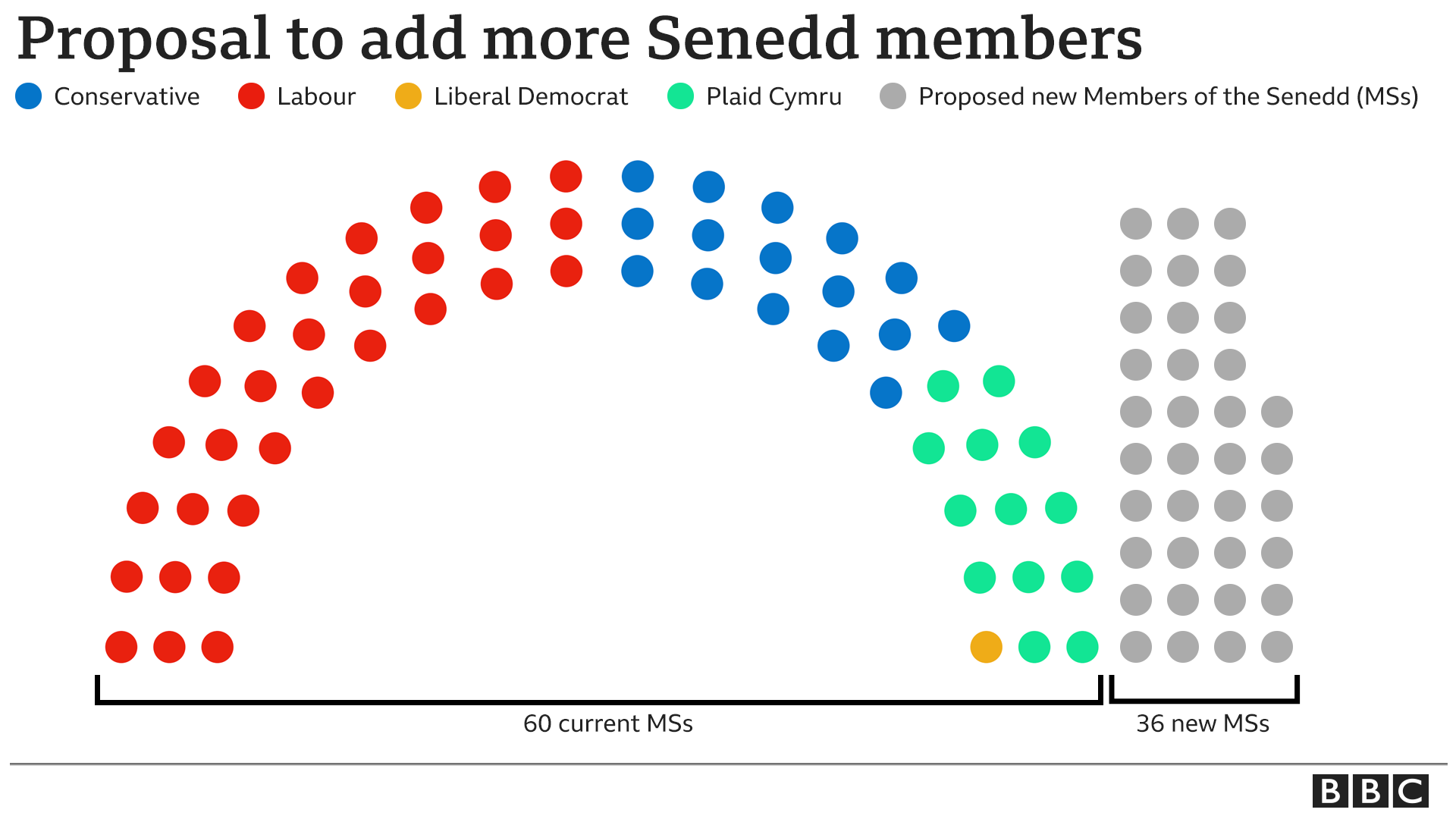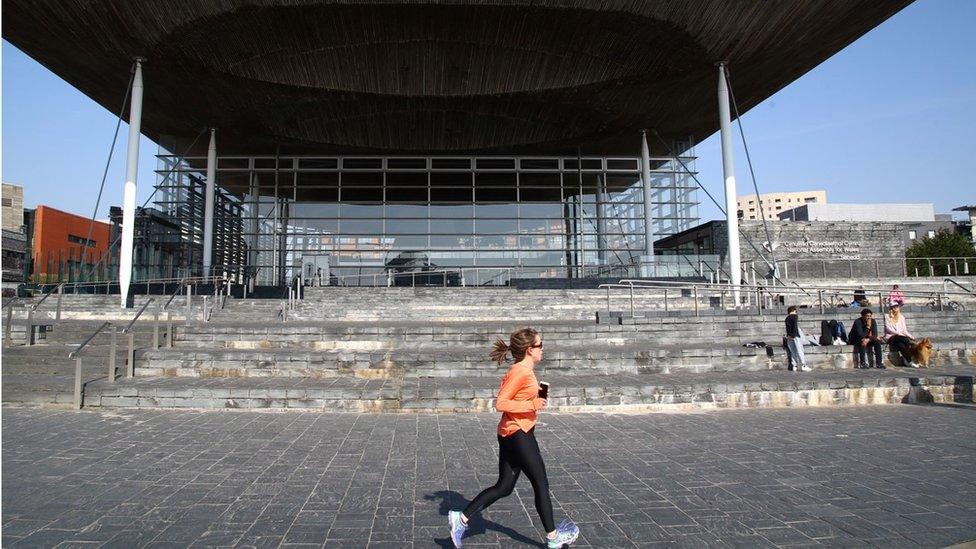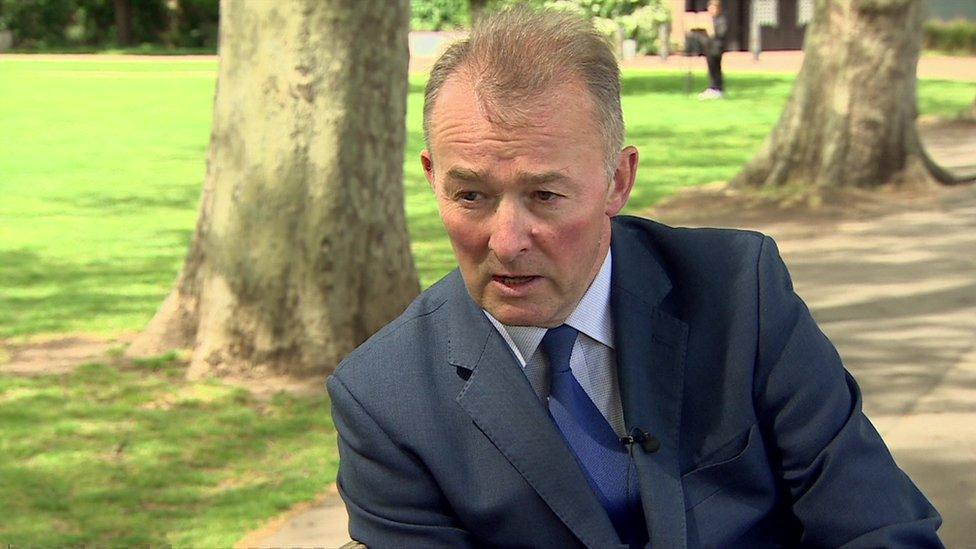Welsh secretary wants public vote on bigger Senedd
- Published

The Senedd chamber would squeeze in 96 politicians, rather than the current 60
The Welsh Labour government should "seek the approval of its voters" and hold a referendum before expanding the Senedd, a Tory UK minister has said.
Welsh Labour ministers and Plaid Cymru announced plans earlier this month for 96 Senedd members, an increase of 36.
The proposals would also end the Westminster-style first-past-the-post voting system for Senedd polls.
Welsh Secretary Simon Hart said voter approval was needed before "proceeding with any of these costly measures".
The proposals were published in the form of a joint paper by Labour First Minister Mark Drakeford and Plaid Cymru leader Adam Price, as part of his party's co-operation agreement with Welsh ministers.
Under the plans people would vote for parties, rather than candidates, with 96 Members of the Senedd (MSs) spread over 16 constituencies.
Under a "closed list system" voters would back a party list rather than a candidate, and not be able to reject any individual candidates nominated.
Parties would be required to nominate lists made up equally of men and women, with candidate lists alternating between men and women,.
The plans would scrap the first-past-the-post system, currently used to elect 40 of the 60 Senedd members as well as MPs at Westminster, for Welsh Parliament elections.

In Westminster, on Wednesday, Conservative MPs expressed concerns about the costs of the reforms and said the money could be better spent on public services.
At Wales Office questions, Tory Devizes MP Danny Kruger said: "The Welsh government has decided it wants to increase the size of the Senedd, however there are real concerns that this will lead to a lack of proportionality in representation.
"Does he agree that this money would be much better spent on public services?"
Mr Hart replied: "Indeed I do. I have to say if this government was making suggestions of this nature involving the constitution and voting measures, I have every belief that pretty well all of the members opposite would be saying this should be subject to a public referendum at the very least.
"So, I would suggest that the proper course of action for Welsh government is to seek the approval of its voters before proceeding with any of these costly measures."
'What's to fear?'
Speaking later to BBC Wales, Mr Hart asked said the changes would cost £100m over the five-year term of the next Welsh Parliament, describing it as "odd when we're getting lectured by Mark Drakeford and others about cost of living cost of living issues that he's prepared, the same week as he's doing that, to impose a £100m bill on Welsh taxpayers".
"What's to fear from a referendum?", the Welsh secretary asked. Constitutional issues have normally always been referred to as a referendum.
"I thought they liked consulting the voters.
"Why not get public approval for something which has gone quite so much significant change attached?"

Labour and Plaid have the two-thirds majority needed in Cardiff Bay to get the plans through
On Saturday, Simon Hart's deputy, Wales Office minister David TC Davies, accused the Welsh Labour government was seeking to "lock" itself in power "forever" with the changes.
He told the Welsh Conservative conference the electoral system envisaged would "concentrate power in the hands of" party managers.
The Conservatives in the Welsh Parliament have also opposed the plans as wasteful, but accepted in principle that Labour and Plaid Cymru have a mandate for constitutional change.
Welsh government Deputy Climate Change Minister Lee Waters has defended the proposals on the basis they "gives us a law-making tax raising parliament that is up to the task of scrutinising the government and taking Wales forward".
"Everybody's got their own favourite electoral system, and not one electoral system is without its drawbacks".
"And it gives us a law-making tax raising parliament that is up to the task of scrutinising the government and taking Wales forward," he told BBC Wales earlier in May.

Simon Hart urged Welsh ministers to follow the "proper course of action"
The Welsh Parliament has direct law-making powers and some tax-raising powers, unlike the institution that was created as the Welsh Assembly in 1999.
The argument for a larger Senedd is that 60 members is not enough to scrutinise government decisions and proposed laws.
The Plaid-Labour proposals were submitted to a cross-party committee on Welsh Parliament reform, due to report next week.
Between them Labour and Plaid have the two-thirds majority required to get the plan through the Welsh Parliament.